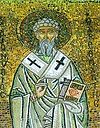

| Previous day | Next day |
| Old Style
October 3
|
Monday |
New Style
October 16
|
| 20th Week after Pentecost. Tone 2. | No fast.
|
![]() Hieromartyrs Dionysius the Areopagite (96), bishop of Athens, the priest Rusticus, and the deacon Eleutherius (96).
Hieromartyrs Dionysius the Areopagite (96), bishop of Athens, the priest Rusticus, and the deacon Eleutherius (96).
St. John the Chozebite, bishop of Caesarea in Palestine (532). Blessed Hesychius the Silent, of Mt. Horeb (6th c.). St. Dionysius, recluse of the Kiev Caves (15th c.). Uncovering of the relics of St. Joseph, elder, of Optina Monastery (1988).
New Hiero-confessor Agathangelus (Preobrazhensky), metropolitan of Yaroslavl (1928).
St. Jerome of Aegina (1966). Hieromartyrs Dionysius, bishop of Alexandria, and the deacons Gaius and Faustus (ca. 265).
Repose of Blessed Olga, fool-for-Christ, of Bogdanoya Bari and St. Petersburg (1960).
Thoughts for Each Day of the Year
According to the Daily Church Readings from the Word of God
By St. Theophan the Recluse

Monday. [Phil. 2:12-16; Luke 6:24-30]
Woe to those who are rich, who are full, who laugh, and who are praised. But good shall come to those who endure every wrongful accusation, beating, robbery, or compulsory difficulty. This is completely opposite to what people usually think and feel! The thoughts of God are as far from human thoughts as heaven is from the earth. How else could it be? We are in exile; and it is not remarkable for those in exile to be offended and insulted. We are under a penance; the penance consists of deprivations and labours. We are sick; and most useful for the sick are bitter medicines. The Saviour Himself all of His life did not have a place to lay His head, and He finished his life on the cross—why should his followers have a better lot? The Spirit of Christ is the spirit of preparedness to suffer and bear good-naturedly all that is sorrowful. Comfort, arrogance, splendour, and ease are all foreign to its searching and tastes. Its path lies in the fruitless, dreary desert. The model is the forty-year wandering of the Israelites in the desert. Who follows this path? Everyone who sees Canaan beyond the desert, boiling over with milk and honey. During his wandering he too receives manna, however not from the earth, but from heaven; not bodily, but spiritually. All the glory is within.
Articles
 Venerable Dionysius the Recluse of the Kiev CavesSaint Dionysius, Hermit of the Kiev Caves, Far Caves, called Schepa, is mentioned briefly in the Kiev Caves Paterikon. |


